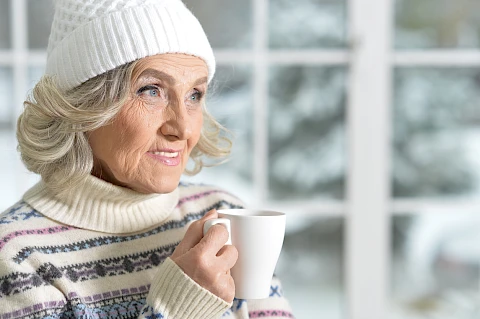
Winter is a beautiful season, but it can also bring unique challenges for seniors. Ice, snow, and cold temperatures can make it difficult to stay safe and healthy. It is always a good idea for seniors to take extra precautions during this time of year to ensure a comfortable, warm, and healthy winter season. Learn some tips and proactive steps seniors can take to stay safe and engaged all winter.
How to Prevent Falls
One of the biggest risks during winter is falling due to ice, snow, and slippery surfaces. Falls can be dangerous for seniors and lead to serious injuries. Here are a few ways to make outdoor and indoor spaces safe during winter:
- Keep Pathways Clear—Ensure that pathways and walkways are clear of snow and ice. Regularly shoveling and using salt or sand can prevent surfaces from becoming slippery.
- Use Simple Home Modifications —Install bathroom grab bars and place non-slip mats in tubs and showers. Adequate lighting throughout the home helps prevent tripping.
- Ensure Proper Footwear — Choose shoes and boots with good traction and use mobility aids like canes with ice tips to provide better stability.
How to Stay Warm
Seniors are more susceptible to hypothermia and frostbite in the cold temperatures. Here is how to stay warm:
- Dress Appropriately — Layering clothing helps trap body heat and warm fabrics like wool or fleece can provide added insulation. Wear gloves, hats, and scarves for extra warmth when going outside.
- Keep the House Warm — Ensure your home has proper insulation and consider using space heaters for additional warmth. Remember to follow safety instructions to prevent fires. Weatherproofing windows and doors can keep the cold air out and warm air in.
- Know the Warning Signs — Watch for warning signs of hypothermia, like shivering, confusion, and slowed breathing. Seek help immediately if you experience any of these symptoms. Frostbite can cause numbness or tingling in the extremities, signaling a need to get indoors and warm up.
How to Stay Healthy
Seniors must pay attention to their overall health despite the urge to hunker down. Here is how:
- Be Physically Active — Consider joining community programs that offer senior-friendly exercise classes or explore simple at-home workouts like yoga or stretching. Be sure to consult with healthcare providers before starting any new exercise routine.
- Eat Right — Eating a balanced diet with plenty of fruits and vegetables helps boost immunity and energy levels. Stay hydrated and consider a vitamin D supplement as sunlight exposure can be limited during winter.
- Get Regular Check-Ups — Schedule appointments with your doctor to monitor and manage health concerns. Keeping up with these visits can help address issues before they become serious.
How to Maintain Social Connections
Staying connected with others is crucial for mental health and emotional well-being. Here's what you can do:
- Keep in Touch — Make an effort to reach out to family and friends regularly. Simple phone calls or video chats can make a big difference in reducing feelings of loneliness.
- Participate in Community Events —Local community events and senior programs offer great opportunities for social interactions. Explore what is available in the area and get involved.
- Utilize Technology — Technology can also open doors to virtual socialization. You can join book clubs, and hobby groups, or chat with friends on social media.
Senior Helpers Princeton Can Help With Winter Safety
Senior Helpers offers a wide range of comprehensive, in-home senior care services. If you live in the Princeton, Plainsboro, Hopewell, or Lawrenceville areas, contact us anytime at Senior Helpers Princeton. We are here to assist seniors in implementing these strategies, so they enjoy a safe and fulfilling winter season.